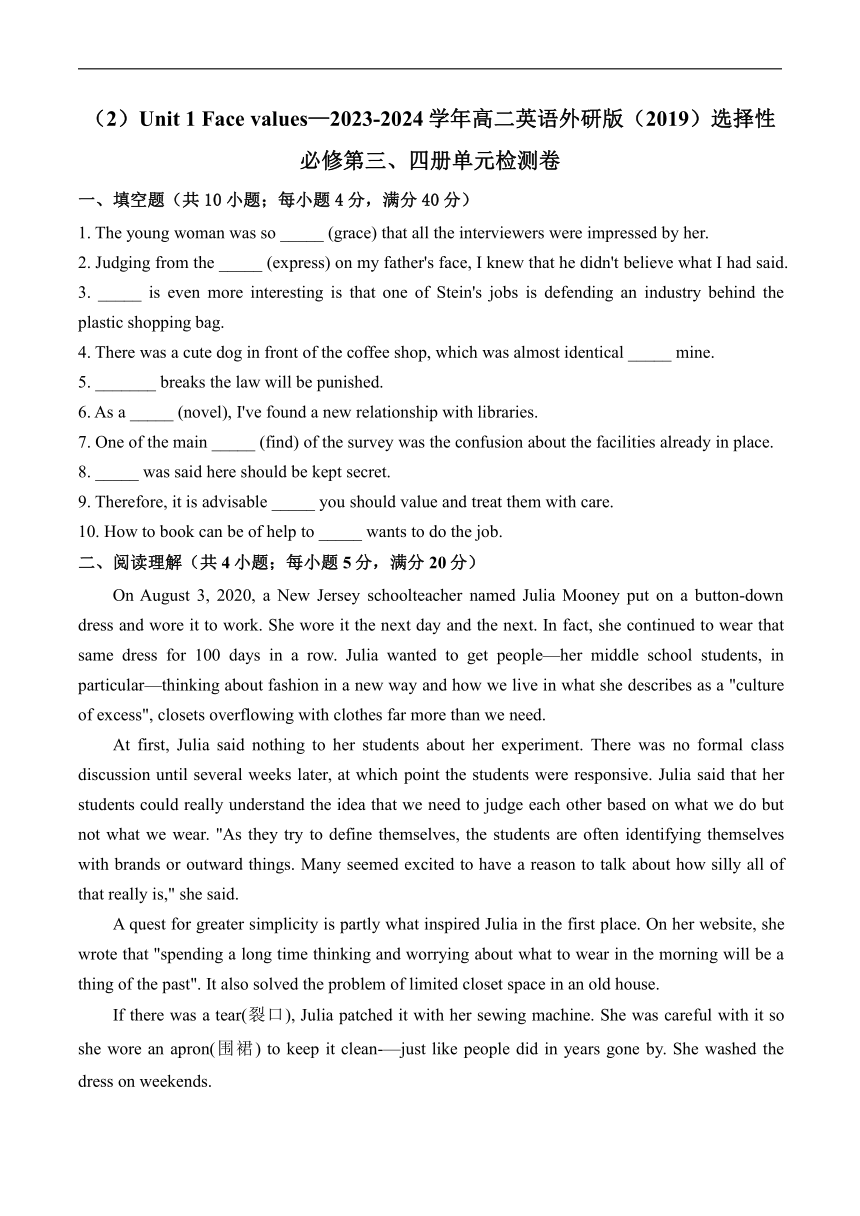
(2)Unit 1 Face values—2023-2024学年高二英语外研版(2019)选择性必修第三、四册单元检测卷 一、填空题(共10小题;每小题4分,满分40分) 1. The young woman was so _____ (grace) that all the interviewers were impressed by her. 2. Judging from the _____ (express) on my father's face, I knew that he didn't believe what I had said. 3. _____ is even more interesting is that one of Stein's jobs is defending an industry behind the plastic shopping bag. 4. There was a cute dog in front of the coffee shop, which was almost identical _____ mine. 5. _____ breaks the law will be punished. 6. As a _____ (novel), I've found a new relationship with libraries. 7. One of the main _____ (find) of the survey was the confusion about the facilities already in place. 8. _____ was said here should be kept secret. 9. Therefore, it is advisable _____ you should value and treat them with care. 10. How to book can be of help to _____ wants to do the job. 二、阅读理解(共4小题;每小题5分,满分20分) On August 3, 2020, a New Jersey schoolteacher named Julia Mooney put on a button-down dress and wore it to work. She wore it the next day and the next. In fact, she continued to wear that same dress for 100 days in a row. Julia wanted to get people—her middle school students, in particular—thinking about fashion in a new way and how we live in what she describes as a "culture of excess", closets overflowing with clothes far more than we need. At first, Julia said nothing to her students about her experiment. There was no formal class discussion until several weeks later, at which point the students were responsive. Julia said that her students could really understand the idea that we need to judge each other based on what we do but not what we wear. "As they try to define themselves, the students are often identifying themselves with brands or outward things. Many seemed excited to have a reason to talk about how silly all of that really is," she said. A quest for greater simplicity is partly what inspired Julia in the first place. On her website, she wrote that "spending a long time thinking and worrying about what to wear in the morning will be a thing of the past". It also solved the problem of limited closet space in an old house. If there was a tear(裂口), Julia patched it with her sewing machine. She was careful with it so she wore an apron(围裙) to keep it clean-—just like people did in years gone by. She washed the dress on weekends. "The challenge I'm presenting is this: Let's think before we buy it, wear it, throw it away and buy one again. Are we just perpetuating(使持续) a culture that defines us based on what we're wearing rather than what we're doing What if we spent our energy trying to be good interesting humans instead of trying to look good and interesting " she said. Julia herself is back to wearing pants to work, but the effect of the experiment lingers. She said, "I'm expressing my interest in the health of our planet and the people who occupy it, while cha ... ...
~~ 您好,已阅读到文档的结尾了 ~~

